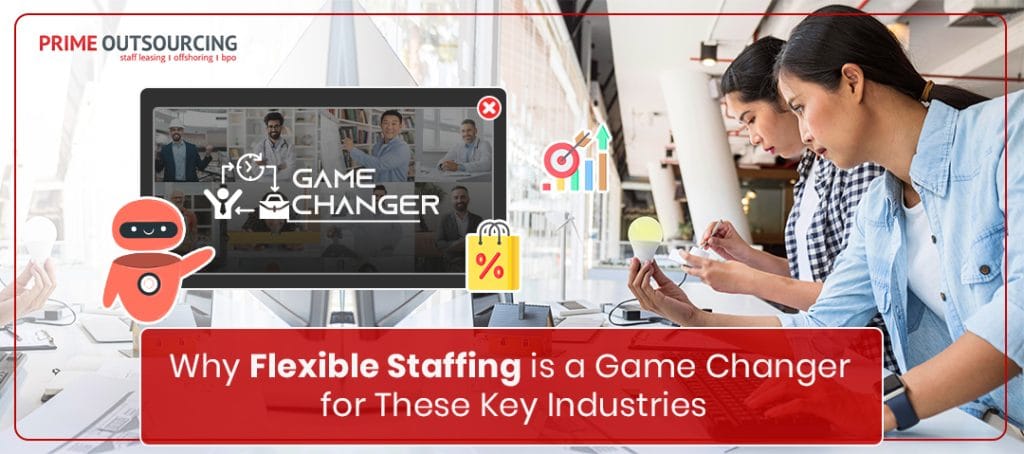
Companies are increasingly looking for ways to adapt to changing demands. One of the most effective strategies businesses have embraced is flexible staffing. This approach allows companies to scale their workforce up or down as needed, saving costs while meeting fluctuating business requirements.
From healthcare to retail, many industries are leveraging it to stay competitive. But what makes it such a game-changer? In this blog, we will explore how flexible staffing benefits various key industries.
The Rise of Flexible Staffing
The move in favor of flexible staffing has accelerated recently. According to a Gartner report, 32% of businesses are using contingent labor to replace full-time staff to save money. The global pandemic further compelled businesses to use more flexible workforce strategies to deal with erratic workloads, requests for remote labor, and changing market dynamics.
According to a Statista analysis, the global market for flexible workforce services was estimated to be worth $490 billion in 2020. Between 2021 and 2026, the market is expected to increase at a compound annual growth rate (CAGR) of 7.8%. This change is more than a fad; it’s upending international industries.

Why Is It A Game-Changer
Flexible staffing has numerous advantages that are crucial for businesses in different industries seeking to maintain their competitive edge:
- Cost-Efficiency: You can avoid high costs associated with full-time employees, such as benefits, insurance, and paid leave, by hiring temporary or part-time workers.
- Access to Specialized Skills and Talent: You can bring in experts for short-term projects, gaining access to specialized skills that may not be available in their permanent workforce.
- Scalability: Flexible staffing allows you to adjust their workforce according to seasonal demand or project requirements, improving operational efficiency.
- Business Continuity: When full-time employees are unavailable due to illness, vacation, or other absences, flexible staffing ensures that productivity remains uninterrupted.

Key Industries Benefiting from Flexible Staffing
Although flexible staffing has many advantages, it is also causing considerable changes in some businesses. These are the following industries:
Healthcare
Staffing shortages are a common occurrence in the healthcare industry, as patient volumes fluctuate due to seasonal illnesses, emergencies, and long-term care requirements.
Staffing Industry Analysts (SIA) research found that 73% of US healthcare facilities employ temporary or per diem workers. The COVID-19 pandemic in 2020 caused a 35% increase in the need for temporary nurses. Additionally, the data shows that 18% of hospital closures during the pandemic were caused by personnel shortages, emphasizing the need for flexible workforce options.
Flexible staffing allows hospitals, clinics, and other healthcare facilities to fill gaps in critical roles like nursing, administrative work, and specialty care.

Retail
85% of retailers hire seasonal workers to handle higher demand during peak shopping hours, according to a RetailWire report.
This suggests that demand for retail businesses—especially e-commerce ones—varies significantly, especially during the holidays and during sales like Black Friday.
Additionally, a 2022 report issued by the U.S. The Bureau of Labor Statistics (BLS) said that the final quarter of the year saw the addition of almost 500,000 temporary positions, mostly due to retail demand.
Thus, seasonal hiring is made possible by flexible staffing, which is a useful strategy that spares shops the expenses of having a large, year-round workforce.

Information Technology
Because the information technology industry is project-driven, it frequently needs specialized capabilities for temporary work assignments.
IT organizations can engage experts on a contract basis, including project managers, cybersecurity specialists, and software engineers, thanks to flexible staffing. This strategy guarantees that companies have the knowledge they require without requiring long-term employment.
According to research published in the Harvard Business Review, 57% of IT companies use contract labor to fill specialist positions. Additionally, as companies emphasize digital transformation initiatives more and more, the demand for temporary tech workers is expected to expand by 14% between 2021 and 2026.

Manufacturing
Production peaks and troughs are common in manufacturing companies because of changes in the market or new product introductions.
Manufacturers can reach production targets without committing to permanent hiring by using flexible staffing solutions to hire temporary labor for short-term projects.

Logistics and Supply Chain
To handle demand peaks, businesses may swiftly hire drivers, logistics coordinators, and warehouse employees thanks to flexible staffing.
Global supply chain shifts, e-commerce demand, and seasonal sales significantly impact the logistics sector. Therefore, in times of supply chain interruptions, which have become more frequent in recent years, flexible staffing is extremely helpful.
A McKinsey & Company analysis states that flexible staff is essential for supply chain resiliency. According to the survey, businesses that employed temporary workers recovered from supply chain disruptions 15% quicker than those that only employed full-time workers.

Conclusion: The Future of Flexible Staffing
Flexible staffing has proven to be a game changer across multiple industries, offering agility, cost savings, and access to specialized talent.
As businesses navigate the challenges of an unpredictable economy, the demand for adaptable workforce solutions will only grow. Whether in healthcare, retail, IT, manufacturing, or logistics, flexible staffing empowers companies to meet their evolving needs while staying competitive.
Unlock the Benefits of Flexible Staffing with PrimeOutsourcing
Is your business prepared to adapt to fluctuating demands and stay ahead of the competition? Work with PrimeOutsourcing. Contact us today to learn how flexible staffing can transform your workforce and help you achieve your business goals.
Read more: Flexible Staffing Solutions: The Key for Business Dynamic Needs



